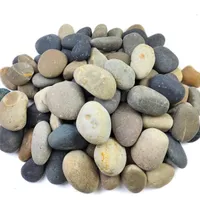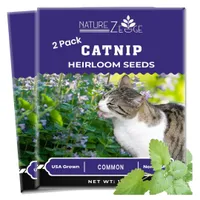How to keep cats out of your yard: 6 tips from a vet
Wondering how to keep cats out of your yard? Prevent unwelcome feline visitors with this vet’s top tips

Trying to figure out how to keep cats out of your yard is likely high on your priority list if you already have a kitty of your own and want to avoid fights over territory or you have beautiful flower beds that you’d prefer little paws didn’t dig up!
There’s an ongoing debate about indoor vs outdoor cats and which is the better option for their health and wellbeing. However, regardless of which side of the fence you sit on when it comes to that argument, one thing is clear — cats that have unrestricted access to nature’s big backyard are likely to roam.
Thankfully, there are plenty of things you can do to keep nosy neighborhood felines from visiting your yard, although patience is going to be key. “Keeping unwanted cats out of your garden isn’t easy and can be frustrating, but it’s important not to cause any harm or distress to the cat,” says expert vet Dr. Hannah Godfrey.
With that in mind, we asked Dr. Godfrey to provide her top tips for keeping cats out of your yard and she had some great ideas which we’ve shared below. Also, if you already have a feline friend, we highly recommend investing in one of the best microchip cat flaps as this will ensure they can get back into the house quickly if they feel stressed by four-pawed intruders and that no neighborhood cats can follow them.
Why cats in the yard can be a problem
There are some things you only know if you're a cat owner and then there are other things that are universally know — like the fact that our feline friends tend to love to roam!
If you love cats, you may ask why the need to stop them coming into your garden? Visiting cats and even your own cat can be a real mischief outdoors. For starters, they have a tendency to ruin your lawn and flower beds. Cats not only love to eat grass but these curious critters will walk over, dig up and even eat your plants depending on what you’ve grown.
Plus, if you own your own cat, figuring out how to get cats to get along can be complex and one of the problems of unwelcome visitors is that they may take an instant dislike to your kitty companion. Cats like to mark their territory, which could lead to fighting and your pet getting injured. So if you're looking for ways to be the best cat owner, keeping other cats out of your yard will go a long way in helping to ensure your cat stays happy and healthy.
Get the best advice, tips and top tech for your beloved Pets
Another problem with cats marking their territory is that they’re doing their business in your yard (check out our guide to 'what does a cat spraying look like and why do they do it?' for more on what to lookout for). Cat urine is not generally a problem for your soil unless it is a large amount in one area. However, cat feces contains parasites and pathogens that are dangerous to humans, especially if you’re working with your hands in the garden, growing vegetables or have kids playing outside.
Cats are curious animals and they will come into your garden not only to explore, but to hunt and mate. They can be quite a nuisance, jumping and climbing over your garden furniture, knocking over pots and littering your back yard with whatever they choose to bring in with them.
Unfortunately, this often includes animals they’ve killed such as songbirds. Millions of birds are killed a year by garden cats and it’s not something you want in your outdoor haven. Luckily, there are many ways of deterring cats without causing them any harm.
Ways to keep cats out of the yard

So how can you stop cats from coming into your garden? You want to try and make the prospect as unappealing to them as possible, whether that’s making it difficult for them to get in or using items in your garden that they will want to avoid. These are just some of the ways to keep your garden safe from roaming felines.
1. Make surfaces uncomfortable to walk on
If you don’t want cats walking all over and digging up your plants, you’ll want to make surfaces harder or less appealing to walk on. Plant prickly or spiky plants, place shrubs close together or lay chicken wire under mulch to make it more difficult for cats to unbury. You can also lay pine cones, egg shells, pebbles or pieces of wood chippings in the soil or around your bedding to make it less comfortable for their paws. If you keep your flower beds wet, this might help too as cats are not fans of walking on wet ground.
"As long as the material is uncomfortable rather than sharp or dangerous, this could make your garden seem less appealing because cats have sensitive feet and like somewhere comfortable to rest," says Dr. Godfrey.
FANTIAN Store Natural Bulk Stones Pebbles 20lb bag
These smooth and clean mixed-color river rocks are unpolished and contain no dyes or fillers. The stones won't fade or deteriorate over time and they're brilliant for adding to your garden to keep weeds and cats away!
2. Use scents they don’t like
If you’re already spending time in the garden, why not try planting scents that cats don't like?
"Rosemary, citrus, peppermint, lavender, and thyme are just some of the strong smells that cats don’t like," says Dr. Godfrey. "Keeping plants or citrus peels at points where cats tend to enter the yard will help to deter them. Essential oils are often more effective, but have to be replaced regularly and used sensibly and sparingly to avoid causing skin or airway irritation to the cat."
If you want to try essential oils, mix a few drops of essential oils such as peppermint, eucalyptus or rosemary with a cup of water and spray the area you don’t want the cat to enter as the smell will repel them.
3. Keep your garden tidy and clutter-free
When it comes to tips on how to keep your cat in the yard, a not-so-tidy garden and a bit of mess is actually rather helpful. But it's the opposite if you're wanting to deter kitties from visiting.
Keeping your garden tidy and clutter-free will make your garden less interesting to cats. Don’t leave items lying around that may pique a cat's curiosity, whether that’s your kids’ or your pets’ toys, or loose garden or laundry items like string.
"An untidy yard provides lots of places for cats to hide, hunt, and play, so keeping it as tidy (and therefore boring!) as possible could help to make it less appealing for cats," Dr. Godfrey confirms.
Make sure you don’t leave leftover food out either – and this means food left out for stray cats too. You might think you’re doing a good deed, but if you feed them the best cat food, they’ll definitely be back for more. Plus, you could attract other unwanted animals such as racoons or make the cat sick as they’re not used to the food they’ve been given. Untidy bins and food waste could also attract mice, which again would entice a cat.
4. Build a fence
The easiest way to stop a cat getting in is to build a high, close-boarded fence, but this involves a lot of planning and you’ll need building permission. To keep cats from jumping over, the fence will need to be at least 5.9ft (1.8m) high with an inward facing wire or netting overhang, but it also means ensuring there aren’t any overhanging trees or objects, which the cat can use to get over. Dr. Godfrey says you also need to be mindful of gap sizes.
"If you decide to build a fence or use netting to keep cats out, make sure that the holes or gaps are an appropriate size so that cats can’t get their heads or limbs stuck. Keep it well-maintained so that there are no sharp edges that can cause injury."
5. Install a sprinkler
You may have heard people recommend using a spray bottle or hose and squirting water at unwanted feline visitors to get rid of them. This is not a humane method of deterring cats, however according to Dr. Godfrey, a sprinkler can be a good option.
"Firing water at cats in your garden can cause them stress. But if you have a sprinkler that’s used regularly this is likely to deter cats from coming in just in case."
Eden 96213 Lawn & Garden Essential Oscillating Sprinkler
With 16 precision nozzles to provide maximum coverage of large lawns or gardens, this easy to use sprinkler will keep your grass and plants in tip-top condition while keeping your yard free of feline visitors!
6. Try using sound
If a cat does manage to get in to the yard and you see them, simply clap your hands together to scare them or shoo them away.
"Long-term noise deterrents that emit sounds that cats don’t like are not a great idea since they cause stress. But one-off noises like clapping (rather than an air horn or similar) could be just enough to get a cat to move on," explains Dr. Godfrey.
7. Create a cat corner

If you’ve tried all of these methods and failed, you could do the opposite. Instead of attempting to deter your neighboring cats, invite them in, but to only one section of your garden. By creating a cat corner with catnip, which they love, and a sandbox as a litter tray, hopefully they’ll stick to the area you’ve set up for them and leave the rest of your garden alone.
Great value for money, this two-pack of catnip seeds are USA-grown and packed fresh every season.
What not to use to keep cats out of your yard
We wouldn’t recommend cat repellent products, but if you do choose to use these, make sure they are approved and licensed products and that you follow the instructions carefully.
You should also be careful if making your own deterrents at home. Items such as coffee granules, which can be used as a deterrent, can actually be harmful to cats.
We hope one or more of these methods will help you keep your garden cat-free. If one stops working, try changing tactics as cats are clever so you’ll want to keep them on their paws.
Can you train a cat? You certainly can! Here are our favorite 32 tips for training your cat that will set you and your feline friend up for success.

Dr Hannah Godfrey studied Veterinary Medicine at the Royal Veterinary College London. After graduating in 2011, Dr Godfrey went on to become a veterinary surgeon, conducting surgery consultations on a range of animals at a small independent practice in Cardiff, South Wales, UK. Dr Godfrey has a strong interest in soft tissue surgery. When she’s not helping animals back on their feet, Dr Godfrey writes a number of veterinary and animal-focused articles.
- Kathryn WilliamsFreelance writer
- Dr. Hannah Godfrey BVetMed MRCVSVet




